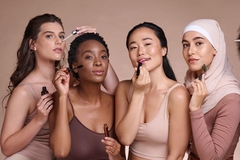Nigeria plans QR code strategy to combat counterfeit cosmetics

Nigeria’s Federal Competition and Consumer Protection Commission (FCCPC) will develop a digital platform to tackle the issue of counterfeit cosmetics. The platform will use QR codes to verify that products are real and trace movements throughout the supply chain.
The development comes as Nigeria faces a significant problem with counterfeit goods. Fake personal care products are unregulated and often contain harmful chemicals, posing health risks to consumers. Counterfeit beauty products can also create an economic threat to authentic manufacturers and beauty companies.
“It’s no news that our markets are flooded with fake, counterfeit, and substandard consumer products that are not fit for intended purposes or unsafe or injurious to consumer welfare,” said Tunji Bello, the executive vice chairman and CEO of the FCCPC at the the FCCPC’s Inauguration of Joint Market Monitoring Taskforce meeting held on June 11.

“At a time when both consumers and businesses are experiencing economic challenges, getting value for money expended on products has become imperative.”
The EU is also looking at QR codes for product authenticity since they provide more access to information. The EU argues that brands could benefit from shifting to digital labels, as it is more sustainable, cost-effective, and reduces packaging waste.
 Common counterfeit cosmetics include makeup, skin care, and perfumes. Harmful cosmetics
Common counterfeit cosmetics include makeup, skin care, and perfumes. Harmful cosmetics
Fake cosmetics are a global issue. A recent report from the OECD found “unusual flows” of personal care products from China transferring through Morocco before entering the EU.
The most common counterfeit cosmetics include makeup, skin care, and perfumes. When duplicated, these fakes can cause serious health issues to users as they may contain high levels of toxins, bacteria, or other banned ingredients.
Even though Nigeria has cosmetics regulations, the country still faces issues with harmful products. The country has been called “the world capital of skin bleaching.”
A previous study found that over 30% of women who use skin-bleaching products experience irritation on the skin.
Amid dangerous products circulating the market, Beiersdorf recently introduced its dermatological skin care brand Eucerin to Nigeria to tackle the widespread use of harmful skin bleaching products.













